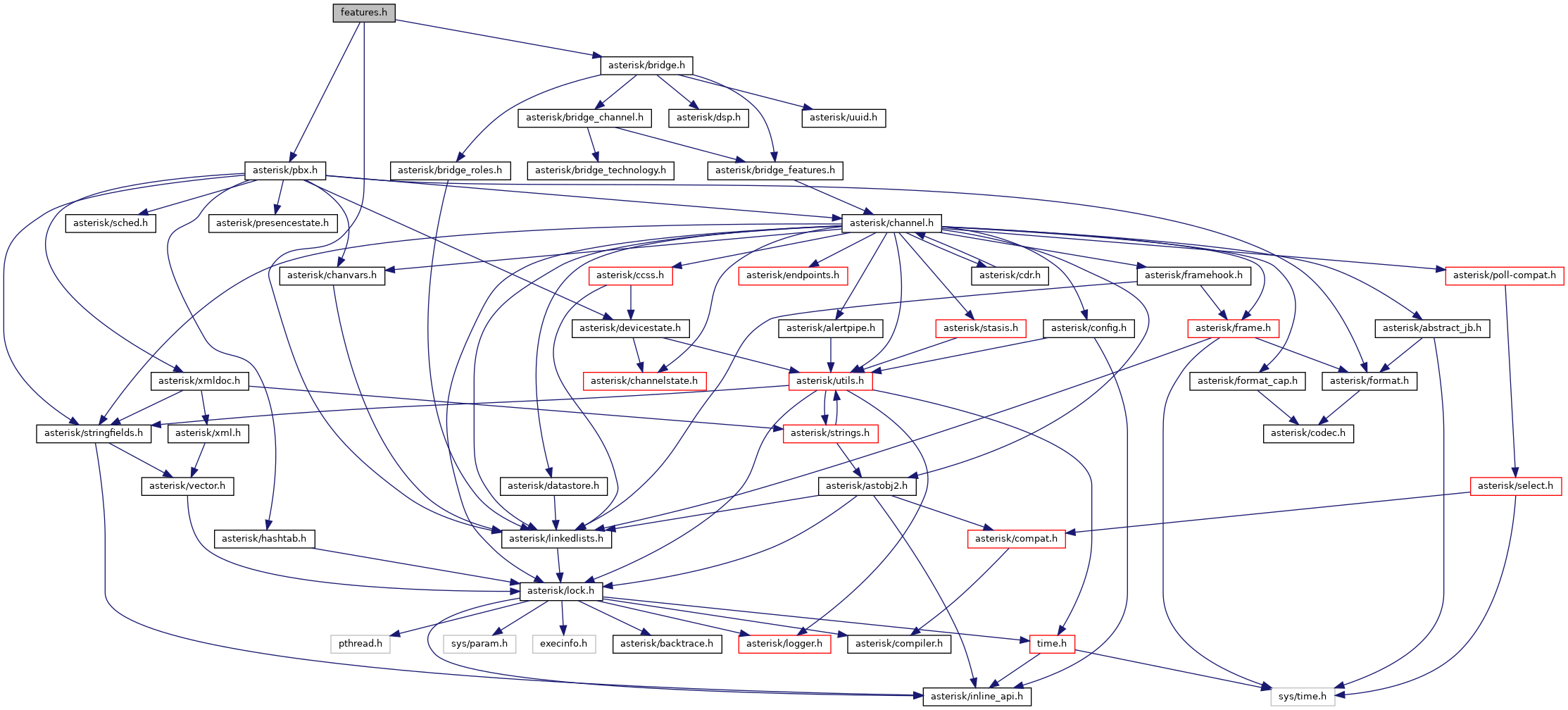Call Parking and Pickup API Includes code and algorithms from the Zapata library. More...


Go to the source code of this file.
Enumerations | |
| enum | { AST_FEATURE_FLAG_NEEDSDTMF = (1 << 0) , AST_FEATURE_FLAG_ONPEER = (1 << 1) , AST_FEATURE_FLAG_ONSELF = (1 << 2) , AST_FEATURE_FLAG_BYCALLEE = (1 << 3) , AST_FEATURE_FLAG_BYCALLER = (1 << 4) , AST_FEATURE_FLAG_BYBOTH = (3 << 3) } |
| main call feature structure More... | |
Functions | |
| int | ast_bridge_add_channel (struct ast_bridge *bridge, struct ast_channel *chan, struct ast_bridge_features *features, int play_tone, const char *xfersound) |
| Add an arbitrary channel to a bridge. | |
| int | ast_bridge_call (struct ast_channel *chan, struct ast_channel *peer, struct ast_bridge_config *config) |
| Bridge a call, optionally allowing redirection. | |
| int | ast_bridge_call_with_flags (struct ast_channel *chan, struct ast_channel *peer, struct ast_bridge_config *config, unsigned int flags) |
| Bridge a call, and add additional flags to the bridge. | |
| int | ast_bridge_timelimit (struct ast_channel *chan, struct ast_bridge_config *config, char *parse, struct timeval *calldurationlimit) |
| parse L option and read associated channel variables to set warning, warning frequency, and timelimit | |
Detailed Description
Call Parking and Pickup API Includes code and algorithms from the Zapata library.
Definition in file features.h.
Enumeration Type Documentation
◆ anonymous enum
| anonymous enum |
main call feature structure
| Enumerator | |
|---|---|
| AST_FEATURE_FLAG_NEEDSDTMF | |
| AST_FEATURE_FLAG_ONPEER | |
| AST_FEATURE_FLAG_ONSELF | |
| AST_FEATURE_FLAG_BYCALLEE | |
| AST_FEATURE_FLAG_BYCALLER | |
| AST_FEATURE_FLAG_BYBOTH | |
Definition at line 33 of file features.h.
Function Documentation
◆ ast_bridge_add_channel()
| int ast_bridge_add_channel | ( | struct ast_bridge * | bridge, |
| struct ast_channel * | chan, | ||
| struct ast_bridge_features * | features, | ||
| int | play_tone, | ||
| const char * | xfersound | ||
| ) |
Add an arbitrary channel to a bridge.
- Since
- 12.0.0
The channel that is being added to the bridge can be in any state: unbridged, bridged, answered, unanswered, etc. The channel will be added asynchronously, meaning that when this function returns once the channel has been added to the bridge, not once the channel has been removed from the bridge.
In addition, a tone can optionally be played to the channel once the channel is placed into the bridge.
- Note
- When this function returns, there is no guarantee that the channel that was passed in is valid any longer. Do not attempt to operate on the channel after this function returns.
- Parameters
-
bridge Bridge to which the channel should be added chan The channel to add to the bridge features Features for this channel in the bridge play_tone Indicates if a tone should be played to the channel xfersound Sound that should be used to indicate transfer with play_tone
- Note
- The features parameter must be NULL or obtained by ast_bridge_features_new(). You must not dereference features after calling even if the call fails.
- Return values
-
0 Success -1 Failure
Definition at line 2540 of file bridge.c.
References ao2_cleanup, ast_answer(), ast_assert, ast_bridge_channel_queue_playfile(), ast_bridge_features_destroy(), ast_bridge_impart(), AST_BRIDGE_IMPART_CHAN_INDEPENDENT, ast_bridge_lock_both, ast_bridge_unlock, ast_channel_get_bridge(), ast_channel_get_bridge_channel(), ast_channel_lock, ast_channel_name(), ast_channel_pbx(), ast_channel_ref, ast_channel_unlock, ast_channel_unref, ast_channel_yank(), ast_debug, ast_hangup(), ast_log, ast_moh_stop(), AST_STATE_UP, ast_strlen_zero(), ast_bridge_channel::bridge, bridge_dissolve_check_stolen(), bridge_find_channel(), bridge_move_locked(), ast_bridge_channel::chan, ast_bridge_channel::features, LOG_WARNING, noanswer, NULL, pbx_builtin_getvar_helper(), RAII_VAR, and value.
Referenced by action_bridge(), bridge_exec(), and manager_park_unbridged().
◆ ast_bridge_call()
| int ast_bridge_call | ( | struct ast_channel * | chan, |
| struct ast_channel * | peer, | ||
| struct ast_bridge_config * | config | ||
| ) |
Bridge a call, optionally allowing redirection.
- Note
- The function caller is assumed to have already done the COLP exchange for the initial bridging of the two channels if it was desired.
Bridge a call, optionally allowing redirection.
- Parameters
-
chan The bridge considers this channel the caller. peer The bridge considers this channel the callee. config Configuration for this bridge.
Set start time, check for two channels,check if monitor on check for feature activation, create new CDR
- Returns
- res on success.
- Return values
-
-1 on failure to bridge.
Definition at line 694 of file features.c.
References ast_bridge_call_with_flags(), and config.
Referenced by app_exec(), and dial_exec_full().
◆ ast_bridge_call_with_flags()
| int ast_bridge_call_with_flags | ( | struct ast_channel * | chan, |
| struct ast_channel * | peer, | ||
| struct ast_bridge_config * | config, | ||
| unsigned int | flags | ||
| ) |
Bridge a call, and add additional flags to the bridge.
This does the same thing as ast_bridge_call, except that once the bridge is created, the provided flags are set on the bridge. The provided flags are added to the bridge's flags; they will not clear any flags already set.
- Parameters
-
chan The calling channel peer The called channel config Bridge configuration for the channels flags Additional flags to set on the created bridge
- Note
- The function caller is assumed to have already done the COLP exchange for the initial bridging of the two channels if it was desired.
Definition at line 604 of file features.c.
References ast_bridge_basic_new(), ast_bridge_basic_set_flags(), ast_bridge_destroy(), ast_bridge_features_cleanup(), ast_bridge_features_destroy(), ast_bridge_features_init(), ast_bridge_features_new(), ast_bridge_impart(), AST_BRIDGE_IMPART_CHAN_INDEPENDENT, AST_BRIDGE_IMPART_INHIBIT_JOIN_COLP, ast_bridge_join(), AST_BRIDGE_JOIN_INHIBIT_JOIN_COLP, AST_BRIDGE_JOIN_PASS_REFERENCE, ast_channel_lock, ast_channel_name(), ast_channel_softhangup_internal_flag(), ast_channel_unlock, AST_SOFTHANGUP_ASYNCGOTO, ast_strlen_zero(), bridge_failed_peer_goto(), config, noanswer, NULL, pbx_builtin_getvar_helper(), pre_bridge_setup(), SCOPE_TRACE, and value.
Referenced by ast_bridge_call(), and try_calling().
◆ ast_bridge_timelimit()
| int ast_bridge_timelimit | ( | struct ast_channel * | chan, |
| struct ast_bridge_config * | config, | ||
| char * | parse, | ||
| struct timeval * | calldurationlimit | ||
| ) |
parse L option and read associated channel variables to set warning, warning frequency, and timelimit
- Note
- caller must be aware of freeing memory for warning_sound, end_sound, and start_sound
Definition at line 866 of file features.c.
References ast_channel_lock, ast_channel_unlock, AST_FEATURE_PLAY_WARNING, ast_log, ast_set_flag, ast_strdup, ast_strdupa, ast_strlen_zero(), ast_true(), ast_verb, config, LOG_WARNING, NULL, pbx_builtin_getvar_helper(), S_OR, strsep(), and var.
Referenced by bridge_exec(), and dial_exec_full().